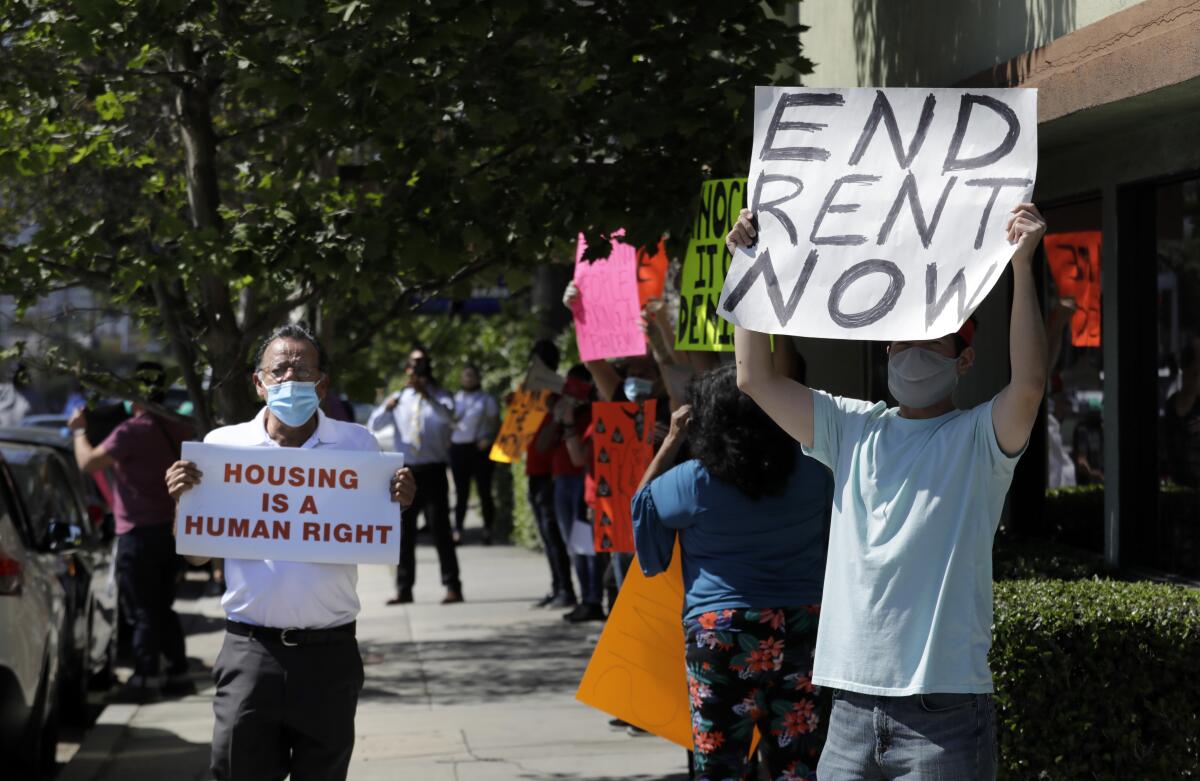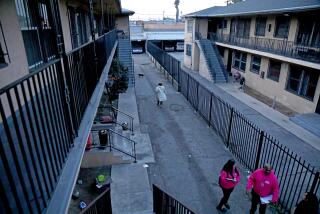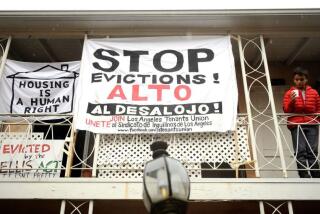California lawmakers reach deal for new eviction protections that would last through January

- Share via
SACRAMENTO — California tenants facing financial hardship because of the COVID-19 pandemic would be protected from eviction through January as long as they pay 25% of their rent during that period, under a proposal announced Friday by state officials.
The plan, which faces the high hurdle of having to get a two-thirds vote in each house of the Legislature by Monday night, was seen as a compromise with landlord groups that oppose a pending bill that would have kept tenants from being evicted if they did not pay any rent as late as April.
For the record:
11:59 a.m. Aug. 29, 2020In an earlier version of this article, Sen. Hannah Beth Jackson was identified as residing in San Francisco. She is from Santa Barbara.
“This will not be the ultimate solution to addressing COVID-19 evictions, but will tide us over for the next five months,” said Assemblyman David Chiu (D-San Francisco), who wrote the bill opposed by landlords. “This gives us the time to reconsider our options next legislative session and potentially work with a new federal administration on economic relief for struggling tenants and property owners.”
The new measure, which Chiu supports in lieu of his stalled bill, would allow landlords who own one to four units to ask their lenders for forbearance on mortgage payments through January.
“We did land on an agreement on evictions, and I am very pleased to announce that,” Gov. Gavin Newsom said during a news conference Friday. “We were able to accommodate each other’s points of view. Not everybody is pleased with every detail. That’s the nature of negotiations, but we did get an eviction deal done and I look forward to signing it very, very shortly.”
Democratic lawmakers said the proposal is the best they can do given that a moratorium on California courts processing evictions expires on Monday, the same day the Legislature is required to adjourn for the year.
Tenant rights advocates say they are disappointed that the bill does not prevent all evictions.
“It’s better than the absolute nightmare that we are facing with evictions, but there are going to be a lot of challenges,” said Shanti Singh, a spokeswoman for Tenants Together. “The biggest concern is: Do we think we are going to be out of this crisis by Feb. 1? Absolutely not. Are people going to magically get all of their jobs back and be able to have money to pay rent on Feb. 1? I don’t think so.”
Francisco Dueñas, executive director of the group Housing Now, said he prefers AB 1436, the other bill by Chiu offering more generous tenant protection.
“We are continuing to push for that, plus a ban on evictions through the end of the pandemic,” he said.
A group advocating for tenants planned a protest outside the governor’s house near Sacramento on Friday, warning that the failure to prevent evictions will put people on the streets. The action was organized by the Alliance of Californians for Community Empowerment Action.
Asked on Friday about complaints from tenant advocates that the bill does not go far enough, Newsom said the deal will help millions of people.
“I don’t know that there is another state leaning in doing more to protect tenants than the state of California,” Newsom said. “The prospects of literally millions of people being evicted or at least subject to eviction substantially was mitigated because of this effort.”
Landlords say the proposed COVID-19 Tenant Relief Act of 2020 is better for property owners than the previously introduced legislation.
The proposed measure “provides a stopgap,” said Debra Carlton, executive vice president of the California Apartment Assn.
“It requires that tenants impacted by COVID-19 start paying at least some of their rent,” she said. “This is a more sensible approach than AB 1436 ... that would encourage tenants to withhold rent, even if they’ve suffered no financial hardships from the pandemic.”
Under the new AB 3088, to qualify for the eviction protections, tenants would be required to file declarations with their landlords that they are suffering financial hardship because of the COVID-19 pandemic.
The landlords also won a concession in the new bill that would not prevent evictions for other causes, such as cases in which renters have become nuisances to neighbors.
Carlton said the ultimate solution would be for the federal government to provide financial assistance to coronavirus-impacted renters so they can pay their rent.
“Otherwise, renters will be hard-pressed to pay the rent that’s accumulated, and housing providers will go out of business,” Carlton said.
Under the compromise proposal, tenants can’t be evicted for nonpayment of rent this year from March to Sept. 1. They can continue to avoid eviction if they pay at least a quarter of their rent starting Sept. 1 and until Jan. 31, 2021, after which full rent would have to be paid.
Tenants could not be evicted after January for failing to pay full rent for the previous months, but the protections would not extend to situations in which tenants fail to pay rent for February.
The unpaid rent — both the amount owed since March and the portion unpaid through the fall and early winter — would be treated as consumer debt, recoverable by a landlord only through small-claims court.
Millions of Californians have lost jobs and income since many businesses were closed in March and residents were told to stay home to slow the spread of COVID-19. The state last week paid unemployment benefits to 4.9 million Californians who have lost jobs or income. In late March, Newsom issued an executive order briefly banning all renter evictions. The state Judicial Council later issued a moratorium on courts processing evictions and this month extended it until Sept. 1.
But legislation to extend the moratorium beyond that time ran into trouble after it drew opposition from landlord groups.
Last week, legislators sidelined a measure by state Sen. Anna Caballero (D-Salinas) that would have created a process for preventing evictions for three years as long as a landlord and tenant reach an agreement on forgiving rent in exchange for the landlord receiving a tax credit — part of a California economic recovery plan crafted by Senate Democrats in May.
Chiu’s bill was held in committee last week to allow negotiations with the governor and representatives for landlords and tenants. That bill would have prevented evictions until 90 days after Newsom lifts the COVID-19 emergency or April 1, 2021, whichever comes first. It would give renters a year to come up with unpaid rent.
The measure also proposed that owners of up to four rental units would be able to request up to a year of forbearance on their mortgages, while owners of larger buildings would get six months.
Assembly Bill 1436 was opposed by groups including the California Chamber of Commerce and the California Rental Housing Assn., a group representing 20,000 landlords.
Opponents warned that Chiu‘s measure would be challenged in court because landlords unable to collect rent could lose their properties to foreclosure if they were unable to pay maintenance expenses and mortgages.
Chiu had proposed requiring banks to provide forbearance of mortgage payments in situations in which rent was not being paid, but opponents said that is a power reserved for the federal government, not the state.
“We recognize that renters that have been adversely affected by COVID-19 and the government’s response to the pandemic need assistance,” Jack Schwartz, the association’s legislative chairman, said during a recent hearing on the bill. “However, these bills will lead to more harm throughout the rental housing industry and California’s economy.”
The bill was co-written by state Sen. Hannah-Beth Jackson (D-Santa Barbara), who said it balanced protections for landlords and tenants.
“We are experiencing an economic and health crisis,” Jackson said. “These calls for help are real, they are immediate, they are justifiable, and we can’t ignore them.”
State Sen. Andreas Borgeas (R-Modesto) said Chiu‘s bill does not set strict enough standards or require documentation to prove a tenant is suffering financially before halting the payment of rent.
He also said it does not sufficiently help those who own five or more rental units and could reduce efforts to expand affordable housing by providing a disincentive for investors, “creating significant long-term housing problems in California.”
Some cities are also scrambling to head off an eviction crisis.
In March, the Los Angeles City Council approved a measure that temporarily bars landlords from removing tenants who have lost income due to the pandemic, and gives affected renters a year after the expiration of the coronavirus-related state of emergency to repay past due rent.
But landlords can still file eviction cases, and renters would have to prove they qualify for relief at trial, worrying tenant activists who note that the vast majority of renters are not represented by lawyers in court.
Earlier this week, City Council President Nury Martinez announced a plan for a $10-million legal defense fund for low-income Angelenos facing eviction once the courts resume processing cases on Sept. 1. She expects the City Council to vote on approving the measure as soon as next week.
“These are people who are struggling to stay above water — many are immigrants, Latinos, Black, and low-income residents who have been hardest hit by COVID-19,” Martinez said in a statement. “People have lost family members, are sick themselves or lost their jobs. They desperately need our help.”
Times staff writer Liam Dillon contributed to this report.
More to Read
Sign up for Essential California
The most important California stories and recommendations in your inbox every morning.
You may occasionally receive promotional content from the Los Angeles Times.











